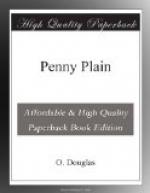They described it minutely to Pamela before she went with them to see it and fix definitely.
“It runs beautifully,” said David.
“It’s about fifty horse-power,” said Jock.
“And, Honourable,” said Mhor, “it’s got electric light inside, just like a little house, and all sorts of lovely things—a clock and—”
“And, I suppose, hot and cold water laid on,” said Pamela.
“The worst thing about it,” Jean said, “is that it looks horribly rich—big and fat and purring—just as if it were saying, ’Out of the way, groundlings’ You know what an insolent look big cars have.”
“Your small deprecating face inside will take away from the effect,” Pamela assured her; “and you need a comfortable car to tour about in. When do you go exactly?”
“On the twentieth,” Jean told her. “We take David first to Oxford, or rather he takes us, for he understands maps and can find the road; then we go on to Stratford. I wrote for rooms as you told me, and for seats for the plays, and I have heard from the people that we can have both. I do wish you were coming, Pamela—won’t you think better of it?”
“My dear, I would love it—but it can’t be done. I must go to London this week. If we are to be married on first June there are simply multitudes of things to arrange. But I’ll tell you what, Jean. I shall come to Stratford for a day or two when you are there. I shouldn’t be a bit surprised if Biddy were there too. If he happened to be in England in April he always made a pilgrimage to the Shakespeare Festival. Mintern Abbas isn’t very far from Stratford, and Mintern Abbas in spring is heavenly. That’s what we must arrange—a party at Mintern Abbas. You would like that, wouldn’t you, Jock?”
“Would Richard Plantagenet be there? I would like awfully to see him again. It’s been so dull without him.”
Mhor asked if there were any railways near Mintern Abbas, and was rather cast down when told that the nearest railway station was seven miles distant. It amazed him that anyone should, of choice, live away from railways. The skirl of an engine was sweeter to his ears than horns of elf-land faintly blowing, and the dream of his life was to be allowed to live in a small whitewashed shanty which he knew of, on the railway-side, where he could spend ecstatic days watching every “passenger” and every “goods” that rushed shrieking, or dawdled shunting, along the permanent way. To him each different train had its own features. “I think,” he told Jean, “that the nine train is the most good-natured of the trains; he doesn’t care how many carriages and horse-boxes they stick on to him. The twelve train has always a cross, snorty look, but the five train”—his voice took the fondling note that it held for Peter and Barrie, the cat—“that little five train goes much the fastest; he’s the hero of the day!”
Pamela’s engagement to Lewis Elliot had made, what Mrs. M’Cosh called, “a great speak” in Priorsford. On the whole, it was felt that she had done well for herself. The Elliots were an old and honoured family, and the present laird, though shy and retiring, was much liked by his tenants, and respected by everyone. Pamela had made herself very popular in Priorsford, and people were pleased that she should remain as lady of Laverlaw.




